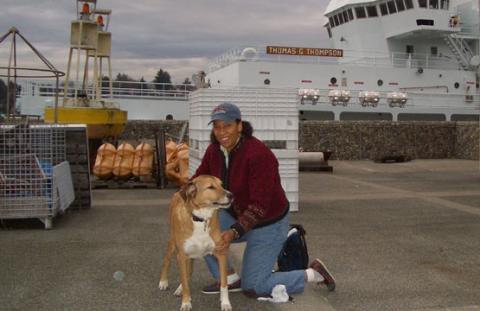
Environmental Systems Research Institute
Get some hands-on experience at sea, such as a short internship or semester at sea, if at all possible. And if you really want to lead a fulfilling life as an oceanographer, you should definitely think about going to graduate school.
Education
- B.S., Geology, Wheaton College
- M.S., Oceanography, Texas A&M University
- Ph.D., Physical Geography and Marine Geology, University of California, Santa Barbara
Salary
$125,000+
What is your current job and what does it entail?
As chief scientist of the Environmental Systems Research Institute (Esri), the world's leading geographic information sysGIS software, research and development company, I aid in formulating and advancing the intellectual agenda for the environmental, conservation, climate and ocean sciences aspect of Esri's work, while also representing Esri to the national/international scientific community. As part of this work I am leading a major ocean GIS initiative across the company, working with GIS software engineers, project managers, professional services (consulting) staff, instructors, business partners and research partners. Esri is focused on improving and expanding its products, tools, services, partnerships and connections with the broader ocean community. I maintain an affiliated faculty appointment as Professor of Geography and Oceanography in the College of Earth, Ocean, and Atmospheric Sciences at Oregon State University. My current research interests include data modeling, benthic terrain and habitat mapping, and coastal and ocean informatics, as well as science communication and ocean conservation. I serve on the U.S. National Academy of Sciences Ocean Studies Board, the NOAA Science Advisory Board, the Science Advisory Council of Conservation International, and many journal editorial boards.
What was the key factor in your career decision?
Growing up in Hawaii and watching Jacques Cousteau on Sunday nights! Seriously!
What do like most about your career?
I truly enjoy meeting some extremely interesting, fascinating, and passionate people from all over the world. And although I don't get to do it much anymore, I really love going to sea on big research ships and working with the equipment at sea (particularly devices to map the ocean floor).
What do you like least about your career?
Sometimes it takes forever (i.e., months to years) to get your ideas funded and then later published in a reputable journal. Both processes can be very laborious and difficult. But it is definitely worth it!
What do you do to relax?
I love cycling, watching cartoons with my dog, and going to movies with friends (particularly foreign or independent films). I also never turn down an opportunity to ride a roller coaster.
Who are your heroes/heroines?
I am a big fan of Sylvia Earle, not only because of her many scientific accomplishments but also because she is so captivating as a speaker and motivator to the general public. There is a good biography of her online. I also greatly admire my mother, as well as Winona LaDuke, Lani Guinier, Amy Grant, Miguel Indurain (five time winner of the Tour de France), Billy Graham and Julian Bond. My favorite historical figures are W.E.B. DuBois and Chief Joseph of the Nez Perce.
What advice would you give a student who expressed an interest in pursuing a career in your field?
Once you decide on what you would like to do, pursue it with great passion! This will tide you over during discouraging, difficult and tedious times. Find a hero or heroine to inspire you and follow their work/accomplishments. Don't shy away from math and computer programming! Watch the Discovery Channel for oceanographic specials -- they are great! Get some hands-on experience at sea, such as a short internship or semester at sea, if at all possible. And if you really want to lead a fulfilling life as an oceanographer, you should definitely think about going to graduate school.
Are career opportunities in your field increasing or decreasing and why?
Unfortunately, opportunities seem to be decreasing at the moment, particularly for oceanographers with Ph.D.s. The number of scientists has steadily increased over the last 10 years or so, with not as many of the older scientists retiring. Hopefully this will change in the near future, but it is hard to predict. In the general field of GIS though, there are great opportunities for students, and this technology is being increasingly applied to ocean research, management and policy.
What will you be doing 10 years from today?
I expect to be doing pretty much the same kind of work, although I don't expect to be going to sea anymore. My interests are moving more toward data processing and analysis, modeling and visualization, particularly with regard to the World Wide Web.

